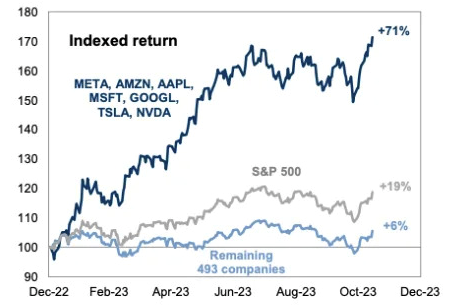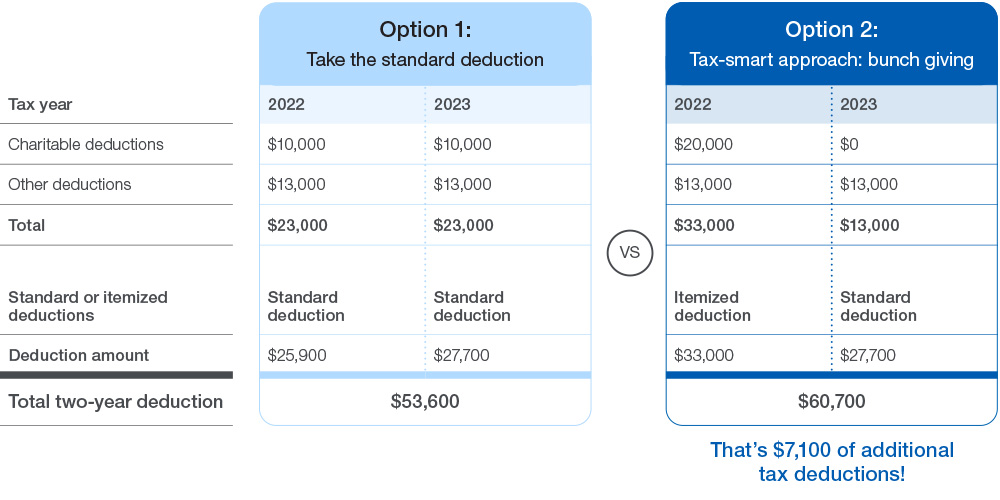As we begin to wrap up the year, it is the perfect time to review year-end planning strategies to ensure that your wealth plan reflects any changes in your circumstances or goals, the current tax environment and the economic landscape. The end of the year is an important time for making financial decisions that can have an impact not only in the new year ahead, but for years to come.
Here are a few high-level takeaways from 2023:
The Magnificent 7 Roar Ahead
Amazon, Apple, Google (Alphabet), Meta, Microsoft, Nvidia and Tesla make up 29% of the S&P 500 market cap and have driven most of the U.S. stock market performance in 2023. Remember: These same stocks were down over 45% on average in 2022. For those investors who didn’t panic and held onto these stocks, patience paid off.

Recession or No Recession?
This year may be remembered for the most anticipated recession in history that didn’t happen. Investors fluctuated on when and if a recession may occur. What we did see was recessions in different sectors, such as commercial real estate and housing, but not for the overall economy.
The Fed vs. Inflation
The Federal Reserve hiked interest rates an additional four times in 2023, with the Fed Funds rate ending the year at 5.25%, a 22-year high. The old mantra of “Don’t fight the Fed” gave way to “higher interest rates for longer.” The Fed has reiterated all year that its inflation target is 2% and that it will do what it needs to do to bring inflation down.
The Rise of AI
Artificial Intelligence has captured investors’ minds and has contributed to the outperformance of both the Magnificent 7 and technology stocks as a whole. During second-quarter earnings calls, 35% of companies in the S&P 500 mentioned AI. This moderated some in the third quarter as only 29% of companies discussed AI, but very strong momentum remains heading into 2024.
Earning Money on Cash
Money market yields reached their highest levels since 2007 with the Fed raising the Fed funds rate. For fixed-income investors, returns on Treasuries, CDs and bonds provided attractive levels to lock in higher yields for longer.
Year-End Checklist
As we near 2024, we recommend that you review the checklist below for planning strategies to consider and discuss.
Income Tax Strategies
• Traditional year-end planning focuses on deferring income to a future year and accelerating deductions into the current year.
• If you anticipate that your marginal income tax bracket will increase, you may consider accelerating income into 2023 and deferring deductions to 2024.
• If you anticipate being in a lower tax bracket next year:
— Defer income if possible in order to postpone paying the tax and have that income at a lower bracket.
— If you itemize on your tax return, bunch your medical expenses in the current year to meet the percentage of your adjusted gross income to claim those deductions.
— Make your January mortgage payment in December so that you can deduct the interest on this year’s return.
Tax-Related Investment Strategies
• Tax-loss harvesting is the strategy of selling securities at a loss to offset a capital gain liability, either for today or in the future.
— Harvest losses by selling taxable investments. (You must wait at least 31 days before buying back a holding sold for a loss to avoid the IRS wash-sale rule.)
— Harvest gains by selling taxable investments if you have a tax loss carryforward.
• Ensure that you have satisfied your required minimum distributions (RMD).
— If you fail to take your RMD, this may result in a 50% penalty.
— If you own an inherited IRA, an RMD may be required separately for that account as well.
Retirement Planning Strategies
• Maximize your IRA contributions. You may be able to deduct annual contributions of up to $6,500 to your traditional IRA and $6,500 to your spouse’s IRA ($7,500 if over age 50).
• Make a Roth IRA contribution if under the applicable income limits.
• Consider increasing or maximizing your 401(k) contribution. This year, the maximum contribution is $22,500 for those under 50 and $30,000 for those over the age of 50. Boosting contributions to your 401(k) can lower your adjusted gross income while increasing your retirement savings.
• Consider making contributions to a Roth 401(k) if your plan allows.
• Consider setting up a Roth IRA for each of your children who have earned income during the year.
Gifting Strategies
• Consider making gifts up to $17,000 per person as allowed under the federal annual gift tax exclusion. You can give up to $17,000 this year to as many people as you want without triggering gift taxes. Payments made directly to educational and/or medical institutions on behalf of your intended beneficiary do not count towards your annual exclusion amount or against your lifetime estate tax exclusion.
• Create a donor advised fund for an immediate income tax deduction and provide immediate and future benefits to charity over time.
• If you already have a donor advised fund or want to donate to a charity, consider gifting appreciated assets that have been held longer than one year to get the fair market value income tax deduction while avoiding income tax on the appreciation.
• If you are over the age of 70½, consider making a direct transfer from an IRA to a public charity. The distribution is excluded from gross income, and you can give up to $100,000 as a tax-free gift from your IRA, which may fully satisfy RMD requirements.
• Consider combining multiple years of charitable giving into a single year to exceed the standard deduction threshold. This is called “bunching.” The chart below reflects the bunching strategy and how it can reduce taxes if executed properly.

Wrapping Up 2023, Planning for 2024
• Discuss major life events with CD Wealth Management to confirm you have clarity in your current situation.
• Communicate with your CPA to provide capital gains and investment income information for a more accurate year-end projection.
• Check your Health Savings Account (HSA) contributions for 2023. If you qualify, you can contribute up to $3,850 (individual) or $7,750 (family) — and an additional $1,000 catch-up if you are over the age of 55.
• Double-check your beneficiary designations for retirement plans, IRAs, Roth IRAs, annuities, life insurance policies, etc.
• If you do not already have identity theft protection, consider purchasing a service to help protect you and your family.
The end of the year is a perfect time to review your financial planning needs, including reviewing the investment portfolio, assessing year-end tax planning opportunities, reviewing retirement goals and managing your legacy plans.
The checklist above includes just some of the items that may apply to you and your family. We are happy to meet to discuss any of the above to ensure that you remain on track with your financial goals.
The CD Wealth Formula
We help our clients reach and maintain financial stability by following a specific plan, catered to each client.
Our focus remains on long-term investing with a strategic allocation while maintaining a tactical approach. Our decisions to make changes are calculated and well thought out, looking at where we see the economy is heading. We are not guessing or market timing. We are anticipating and moving to those areas of strength in the economy — and in the stock market.
We will continue to focus on the fact that what really matters right now is time in the market, not out of the market. That means staying the course and continuing to invest, even when the markets dip, to take advantage of potential market upturns. We continue to adhere to the tried-and-true disciplines of diversification, periodic rebalancing and looking forward, while not making investment decisions based on where we have been.
It is important to focus on the long-term goal, not on one specific data point or indicator. Long-term fundamentals are what matter. In markets and moments like these, it is essential to stick to the financial plan. Investing is about following a disciplined process over time.
Sources: FactSet, Goldman Sachs, Schwab
This material contains an assessment of the market and economic environment at a specific point in time and is not intended to be a forecast of future events, or a guarantee of future results. Forward-looking statements are subject to certain risks and uncertainties. Actual results, performance, or achievements may differ materially from those expressed or implied. Information is based on data gathered from what we believe are reliable sources.
Using diversification as part of your investment strategy neither assures nor guarantees better performance and cannot protect against loss of principal due to changing market conditions.
Past performance is not a guarantee of future results.
The opinions expressed in this commentary are those of the author and may not necessarily reflect those held by Kestra Investment Services, LLC or Kestra Advisory Services, LLC. This is for general information only and is not intended to provide specific investment advice or recommendations for any individual. It is suggested that you consult your financial professional, attorney, or tax advisor with regard to your individual situation.
Securities offered through Kestra Investment Services, LLC (Kestra IS), member FINRA/SIPC. Investment Advisory Services offered through Kestra Advisory Services, LLC (Kestra AS) an affiliate of Kestra IS. CD Wealth Management and Bluespring Wealth Partners LLC* are affiliates of Kestra IS and Kestra AS. Investor Disclosures: https://bit.ly/KF-Disclosures
*Bluespring Wealth Partners, LLC acquires and supports high quality investment adviser and wealth management companies throughout the United States.
Fidelity Investments and Fidelity Institutional® (together “Fidelity”) is an independent company, unaffiliated with Kestra Financial or CD Wealth Management. Fidelity is a service provider to both. There is no form of legal partnership, agency affiliation, or similar relationship between your financial advisor and Fidelity, nor is such a relationship created or implied by the information herein. Fidelity has not been involved with the preparation of the content supplied by CD Wealth Management and does not guarantee, or assume any responsibility for, its content. Fidelity Investments is a registered service mark of FMR LLC. Fidelity Institutional provides clearing, custody, or other brokerage services through National Financial Services LLC or Fidelity Brokerage Services LLC, Members NYSE, SIPC.






